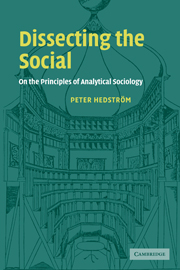Book contents
- Frontmatter
- Contents
- List of figures
- List of tables
- Preface
- 1 The analytical tradition in sociology
- 2 Social mechanisms and explanatory theory
- 3 Action and interaction
- 4 Social interaction and social change
- 5 On causal modelling
- 6 Quantitative research, agent-based modelling and theories of the social (with Yvonne Åberg)
- 7 Coda
- References
- Index
6 - Quantitative research, agent-based modelling and theories of the social (with Yvonne Åberg)
Published online by Cambridge University Press: 22 September 2009
- Frontmatter
- Contents
- List of figures
- List of tables
- Preface
- 1 The analytical tradition in sociology
- 2 Social mechanisms and explanatory theory
- 3 Action and interaction
- 4 Social interaction and social change
- 5 On causal modelling
- 6 Quantitative research, agent-based modelling and theories of the social (with Yvonne Åberg)
- 7 Coda
- References
- Index
Summary
When discussing the relationship between sociological theory and empirical research, Merton always emphasized how each draws strength from the other (e.g., Merton 1968c). Without theory, empirical research often lacks wider significance, and without empirical research, sociological theory easily turns into fictitious storytelling. Although most of us recognize the importance of a symbiotic relationship between theory and research, the current division of labour within the discipline would suggest otherwise. Most theorists specialize in theory and have little or no contact with empirical research, while empirical researchers are rarely seriously interested in theory.
In an influential article, Goldthorpe (1996) discussed how one can bridge this gap between theory and empirical research by establishing a closer link between action-based theories and quantitative research. He argued that the contribution of quantitative research to sociology ‘will be seriously limited unless it is allied in some way or other to accounts of social action’ (1996: 111). For a variety of reasons Goldthorpe meant that rational-choice theory was particularly well suited to this purpose. Like Edling (2000), we have a somewhat mixed attitude towards some of the details in Goldthorpe's proposal. On the one hand his arguments for establishing close links between action-based theories and quantitative research are important and to the point. On the other hand his reasons for believing that rational-choice theory is uniquely suited to integrating quantitative research and sociological theory are not as persuasive. What sociology seems to need is not to bind itself to one specific substantive theory.
Information
- Type
- Chapter
- Information
- Dissecting the SocialOn the Principles of Analytical Sociology, pp. 114 - 144Publisher: Cambridge University PressPrint publication year: 2005
Accessibility standard: Unknown
Why this information is here
This section outlines the accessibility features of this content - including support for screen readers, full keyboard navigation and high-contrast display options. This may not be relevant for you.Accessibility Information
- 4
- Cited by
